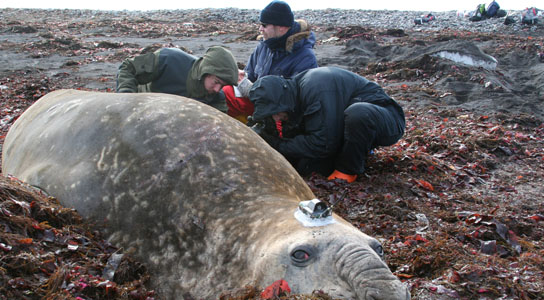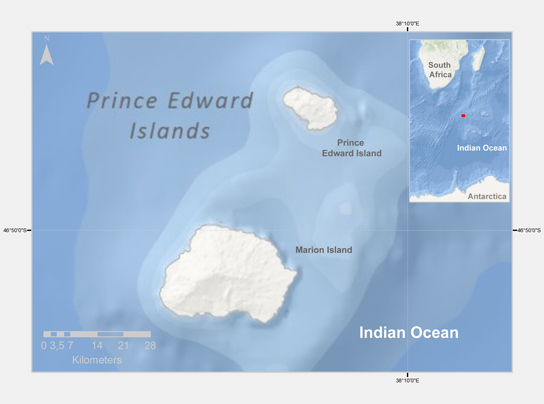
After placing the sensor on the animal’s head the biologists measure its body size. Elephant seals can withstand the cold waters due to their thick layer of blubber. It can be as thick as 15 centimeters (6 inches) and accounts for one-third of the animal’s weight of approximately three metric tons. Credit: Joachim Ploetz, Alfred Wegener Institute
Researchers from the Alfred Wegener Institute for Polar and Marine Research in the Helmholtz Association are studying how warmer ocean water is affecting the diet of an elephant seal. Due to climate change, warmer waters are driving the seals’ food source into deeper waters forcing the seals to dive deeper in search of a meal. Scientists believe the deeper dives will play a negative role in the overall health of the animals since diving deeper means they have less time to for search food.
Global warming is having an effect on the dive behavior and search for food of southern elephant seals. Researchers from the Alfred Wegener Institute for Polar and Marine Research in the Helmholtz Association cooperating in a joint study with biologists and oceanographers from the Universities of Pretoria and Cape Town have discovered that the seals dive deeper for food when in warmer water. The scientists attribute this behavior to the migration of prey to greater depths and now wish to check this theory using a new sensor that registers the feeding of the animals below water.
The southern elephant seals from Marion Island, located in the southwestern part of the Indian Ocean, are extreme divers in the truest sense of the word. The animals spend more than 65 percent of their lives in depths of over 100 meters (330 feet), diving far deeper than their fellow species in southern areas. The maximum dive depth of these seals is over 2000 meters(6,600 feet). However, the water masses through which the elephant seals from Marion Island swim in search of food are becoming increasingly warmer due to climate change and are forcing the animals to dive deeper. The Southern Ocean is warmed primarily in the water levels up to a depth of 1000 meters (3,300 feet) and therefore in those areas in which squid and fish ought to be found. “This prey is moving down to greater depths presumably due to the increasing water temperatures and this is forcing the seals to follow them“, explains Dr. Horst Bornemann from the Alfred Wegener Institute.
Over the course of several years, he and his colleague Dr. Joachim Plötz together with Dr. Trevor McIntyre and other seal researchers from the Mammal Research Institute (MRI) in South Africa have fitted over 30 elephant seals with satellite transmitters. These transmitters, the size of a fist, are attached to the head of the seals using artificial resin immediately after molting and measure the dive depth, water temperature, and salinity every time the animals dive. When the animal resurfaces to breathe the transmitters send their data to the respective research institutes via satellite. The results show that the elephant seals need to dive deeper in warmer water so that they ultimately have less time to actually search for food. ”We, therefore, assume that the animals will find less prey in warmer water masses“, explains Joachim Plötz.

Marion Island is the bigger one of the two Prince Edward Islands in the southern Indian Ocean. It belongs to South Africa. Credit: Antonie Haas, Alfred Wegener Institute
The scientists from Bremerhaven will be going back to Marion Island in April of this year to collect evidence for their theory. This time they wish to equip the animals with a “jaw movement” sensor which has been developed by Japanese biologists at the National Institute of Polar Research in Tokyo. It is not much larger than a small finger and notices when the seal opens its mouth. “So far we can only derive from the dive profile whether an elephant seal was probably following a fish swarm. With this new measuring device we learn whether he has actually eaten“, says Joachim Plötz.
Using this forage data the AWI biologists wish to draw conclusions as to the spatial and temporal distribution of particularly productive zones in the South Polar Sea. “The food in the sea is unevenly distributed. It is not worth the seals fishing anywhere and at any time. With the new data we hope to see the routes taken by the elephant seals of Marion Island and the water levels in which they find food“, says Horst Bornemann.
The scientists also take days of walking over the ”island of horizontal rain“ into the bargain to achieve their research goal. “The elephant seals of Marion Island are very loyal to their location. They return to this island time and again to molt and mate. This behavior gives us the opportunity to consistently fit measuring devices to the same animals thereby gaining an insight into the movement patterns of individual animals. Their movement and dive routes help us to find out where the oceanic food grounds of the Marion Island elephant seals are located“, explains Joachim Plötz.
The extent to which the animals of this rather northerly elephant seal colony are able to adapt to the warming of the ocean remains to be seen. The scientists from Germany and South Africa see only two alternatives for the animals: either the seals extend their hunting grounds to the colder water masses of the Antarctic or they must dive even deeper in the future. The elephant seals from Marion Island are very close to reaching their physiological limits even in their dive behavior today. This leads the biologists to assume that this may reduce the survival rate of the seals in the long term.
The study appeared in the November 2011 issue of the trade journal Marine Ecology Progress Series.
Reference: “Elephant seal dive behavior is influenced by ocean temperature: implications for climate change impacts on an ocean predator” by Trevor McIntyre, Isabelle J. Ansorge, Horst Bornemann, Joachim Plötz, Cheryl A. Tosh, Marthan N. Bester, 2011, Marine Ecology Progress Series.
DOI: 10.3354/meps09383









Be the first to comment on "Warming Ocean Temperatures May Reduce the Survival Rate of Elephant Seals"